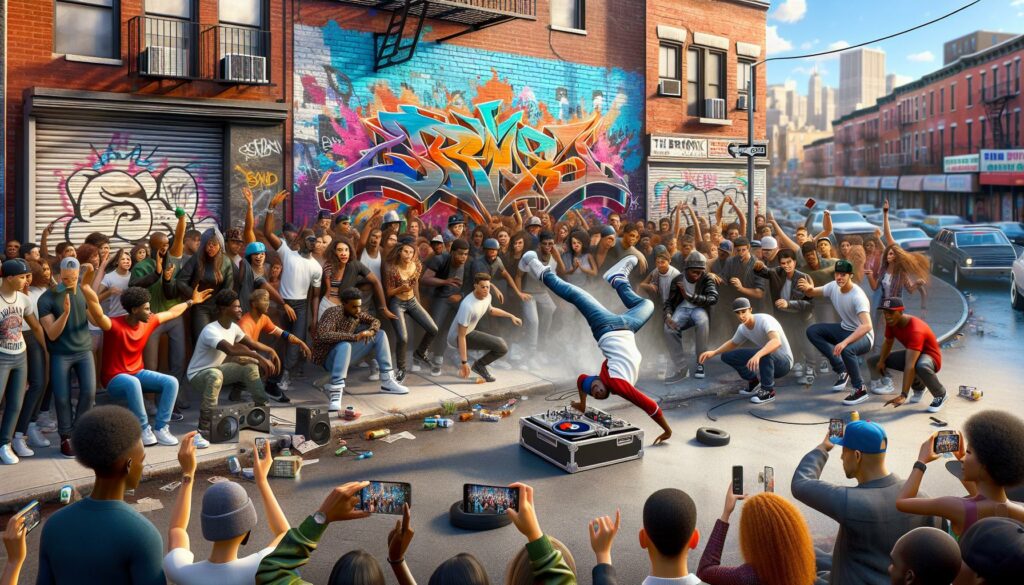Hip hop isn’t just a genre; it’s a cultural movement that’s shaped music, fashion, and society. As I dive into the pages of a hip hop history book, I’m reminded of the powerful stories behind the beats and rhymes that have influenced generations. From its roots in the Bronx to its global impact today, hip hop tells a compelling tale of creativity, resilience, and expression. Exploring this rich history offers a unique lens through which we can understand the struggles and triumphs of artists who’ve paved the way. It’s not just about the music; it’s about community, identity, and the voices that have risen from the streets. Join me as we uncover the pivotal moments and key figures that have defined hip hop, revealing why this vibrant culture continues to resonate with so many.
- Cultural Movement: Hip hop is more than a genre; it represents a significant cultural movement that has influenced music, fashion, and societal issues since its inception in the 1970s.
- Origins: Born in the Bronx through block parties featuring DJing and MCing, hip hop incorporated influences from funk, soul, and disco, paving the way for its mainstream recognition.
- Key Figures: Influential artists like DJ Kool Herc, Grandmaster Flash, Afrika Bambaataa, and Tupac Shakur have greatly shaped hip hop’s evolution, contributing unique techniques and narratives.
- Social Commentary: Hip hop artists often use their lyrics to address pressing issues such as systemic racism, police brutality, and social inequality, making it a powerful medium for activism and dialogue.
- Cultural Influence: The impact of hip hop extends beyond music; it affects various cultural domains including fashion, language, and art, reflecting a broader narrative of identity and resilience.
- Further Reading: Notable books like “”The Hip Hop Wars”” and “”Can’t Stop Won’t Stop”” provide in-depth insights into hip hop’s history, themes, and its role in shaping cultural and social narratives.
Hip Hop History Book
Hip hop originated as a cultural movement in the 1970s and has significantly shaped music, art, and social issues. Understanding its history reveals the dynamic forces that have influenced its evolution.
The Origins of Hip Hop
Hip hop emerged in the Bronx, New York City, during block parties that featured DJing and MCing. Artists like Kool Herc pioneered these early gatherings, using turntables to create rhythmic beats. The genre drew from funk, soul, and disco, with spoken word and poetic lyrics becoming its hallmark. By the late 1970s, hip hop began to gain wider recognition through tracks like “”Rapper’s Delight”” by The Sugarhill Gang, marking its entrance into mainstream music.
Key Figures in Hip Hop’s Evolution
Several key figures have shaped hip hop’s landscape.
- DJ Kool Herc: Credited with developing breakbeat DJing techniques, he laid the groundwork for hip hop music.
- Grandmaster Flash: Introduced innovative DJ techniques like backspinning and punch phrasing, enhancing live performances.
- Afrika Bambaataa: Known for uniting diverse communities through hip hop, he emphasized the genre’s potential for social change.
- Run-D.M.C.: This group elevated hip hop’s status in the 1980s, merging rock elements and fashion into their identity.
- Tupac Shakur and The Notorious B.I.G.: Two iconic rappers whose narratives reflected urban life, their legacies continue to influence artists today.
These figures represent only a fraction of the innovators who have contributed to hip hop’s rich tapestry, each adding unique elements that propelled the genre forward.
Major Themes in Hip Hop History Books
Hip hop history books often explore significant themes that highlight the genre’s societal implications and cultural significance. Understanding these themes offers deeper insights into how hip hop serves as a medium for expression and change.
Social and Political Influences
Social and political influences are central to hip hop’s narrative. Writers examine various historical events, including the Civil Rights Movement and urban poverty, showcasing how these factors shaped hip hop culture. Artists use their lyrics to address issues like systemic racism, police brutality, and economic disparities. Key texts highlight works by Public Enemy and N.W.A, illustrating their roles in sparking dialogue and activism through music. The genre reflects the challenges faced by marginalized communities, serving as a platform for social commentary and empowerment.
Cultural Impact of Hip Hop
The cultural impact of hip hop extends far beyond music. Authors investigate how hip hop influences fashion, dance, language, and art, shaping broad cultural landscapes. The adoption of hip hop aesthetics in mainstream culture demonstrates its reach and importance. Books explore the significance of elements like breakdancing or graffiti, emphasizing their role in conveying messages of rebellion and identity. This cultural blending showcases hip hop as a powerful force that transcends boundaries, inspiring generations to engage with various art forms and social movements.
Notable Hip Hop History Books
Several books provide deep insights into the evolution of hip hop, showcasing its cultural significance and artistic brilliance.
Critical Acclaim and Reception
Noteworthy titles include The Hip Hop Wars by Tricia Rose, which examines the debates around hip hop’s cultural representations and highlights its impact on society. Another seminal work, Can’t Stop Won’t Stop: A History of the Hip-Hop Generation by Jeff Chang, received praise for intertwining personal narratives with historical context, making it engaging and educational. The Revolution Will Not Be Televised by Bill McGraw also offers a critical perspective on the intersection of hip hop and politics. These books not only earned critical acclaim but also established themselves as essential reading for understanding hip hop’s multifaceted nature.
Influence on the Genre and Culture
Influential texts, such as Decoding Hip-Hop: How Hip-Hop Music Shapes Youth Identity by Gwendolyn D. Pough, delve into how hip hop fosters identity formation among youth, influencing social dynamics. The Book of Rhymes: The Poetics of Hip Hop by Adam Mansbach analyzes the artistry within hip hop lyrics, exploring their poetic structure and cultural commentary. These works underscore hip hop’s role in shaping cultural narratives and solidifying its status as a powerful vehicle for social change. Through these texts, it becomes evident how hip hop has transcended music, impacting fashion, language, and lifestyle globally.
Recommendations for Further Reading
Exploring hip hop through literature enhances understanding of its cultural significance and history. The following books provide valuable insights into the genre’s evolution, key figures, and themes.
- “”The Hip Hop Wars”” by Tricia Rose: This book examines hip hop’s cultural representations, revealing its complexities and conflicts. Rose critiques media narratives and discusses the broader implications of hip hop in society.
- “”Can’t Stop Won’t Stop: A History of the Hip-Hop Generation”” by Jeff Chang: Chang’s narrative chronicles the emergence of hip hop culture while highlighting influences from the Civil Rights Movement. The book reflects on the genre as a response to systemic issues faced by marginalized communities.
- “”The Revolution Will Not Be Televised”” by Bill McGraw: McGraw analyzes the sociopolitical landscape surrounding hip hop, showcasing how artists use their platforms to address urgent societal issues. His work illuminates the genre’s role in activism.
- “”Decoding Hip-Hop: How Hip-Hop Music Shapes Youth Identity”” by Gwendolyn D. Pough: This text explores hip hop’s impact on youth culture and identity formation. Pough discusses how lyrics and culture empower young audiences.
- “”The Book of Rhymes: The Poetics of Hip Hop”” by Adam Mansbach: Mansbach delves into the lyrical artistry of hip hop, offering a deep analysis of poetic elements within the genre. His work reveals the craftsmanship behind the music.
Each of these titles serves as a gateway into the rich history and evolving narratives of hip hop, providing essential context for understanding its impact on society.
Exploring hip hop history books has opened my eyes to the profound impact this genre has had on culture and society. Each book offers a unique lens through which I can appreciate the artistry and resilience of hip hop artists. They’re not just musicians; they’re storytellers and activists who reflect the struggles and triumphs of their communities.
As I dive deeper into this vibrant culture, I find myself more connected to the voices that have shaped hip hop. The narratives within these pages remind me that hip hop is more than just music; it’s a movement that continues to inspire change and ignite conversations. I encourage you to pick up a hip hop history book and discover the rich tapestry of stories waiting to be told.



